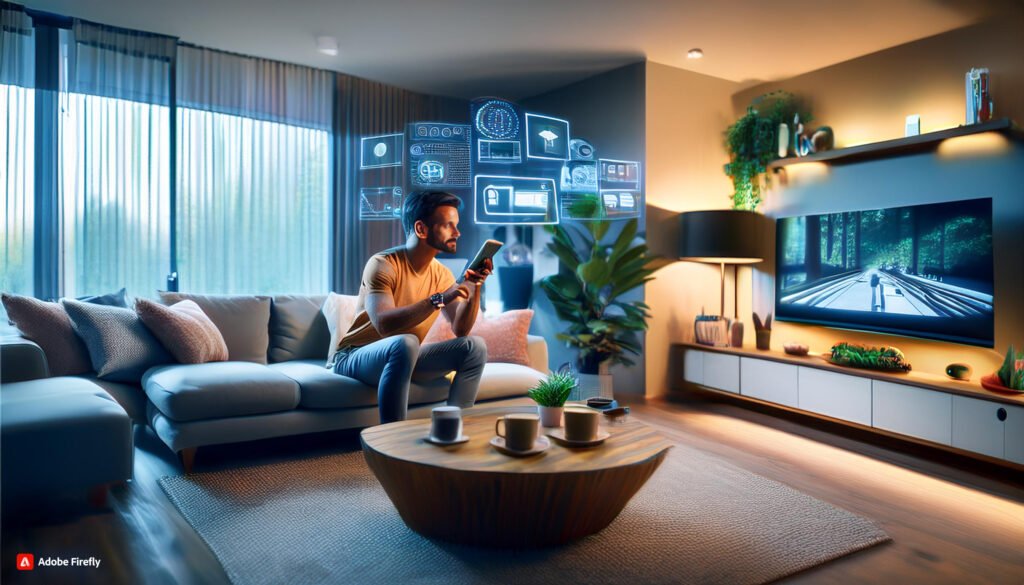Over the past few years, the idea of a smart home has transformed from a futuristic fantasy into a practical everyday experience. At the heart of this transformation is artificial intelligence (AI), which is redefining how we interact with our living spaces. From enhancing convenience to boosting security, AI and smart technology are making homes smarter and more efficient.
Understanding Smart Homes
A smart home is equipped with devices that can be controlled remotely or programmed to operate autonomously. These smart technologies communicate with each other, allowing for seamless integration and coordination. Imagine waking up in the morning to the soft glow of smart lights that gradually brighten, coffee brewing in the kitchen, and your thermostat adjusting to the perfect temperature—all without lifting a finger.

AI’s Role in Smart Homes
AI is the brain behind many of these smart devices. It enables them to learn from our behaviors, adapt to our preferences, and even predict our needs. Let’s explore some key areas where AI, smart technology, and voice assistants enhance smart homes.
1. Automation and Convenience
One of the primary benefits of AI in smart homes is automation. Homeowners can set up routines that automatically trigger actions based on specific times or events. For example, you can program your smart blinds to open at sunrise or have your smart coffee maker start brewing at 7 a.m. every day.
AI takes this a step further by learning your habits. If you regularly adjust the thermostat when you arrive home from work, the AI can recognize this pattern and begin adjusting the temperature on its own. This not only saves you time but also ensures your home is always at a comfortable level when you need it.
2. Energy Efficiency
AI-powered smart homes are designed to save energy. Smart thermostats analyze your heating and cooling patterns and adjust settings accordingly. By optimizing energy use, they can help reduce utility bills. For instance, when you leave home, the thermostat can lower the temperature or turn off entirely. Some smart technologies even integrate weather forecasts to anticipate temperature changes outside, making real-time adjustments to indoor conditions.
In addition, smart lighting systems can detect when a room is occupied and automatically turn lights on or off. This not only conserves energy but also extends the lifespan of your bulbs, making your home both eco-friendly and cost-effective.
3. Enhanced Security
Home security has also seen significant advancements thanks to AI and smart technology. Smart security cameras and doorbells can recognize familiar faces, alerting you to any strangers. AI algorithms can distinguish between normal activity and potential threats, sending you notifications only when necessary.
Moreover, smart locks allow you to control access to your home remotely. If you forget to lock the door when leaving, you can do it from your smartphone. Some systems even let you grant temporary access to guests or service providers, giving you peace of mind.
4. Health and Wellness
AI in smart homes is not just about convenience; it’s also about improving health and wellness. Smart home devices can monitor air quality, humidity levels, and even sleep patterns. For instance, smart air purifiers can detect pollutants and allergens, automatically adjusting their settings to ensure a clean environment.
Additionally, some devices can track your daily activities and remind you to stay active or hydrate. This integration of health technology into our homes encourages healthier lifestyles and helps us take better care of ourselves and our families.
5. Voice Assistants and Interconnectivity
Voice assistants like Amazon’s Alexa, Google Assistant, and Apple’s Siri have become central to many smart homes. These AI-driven systems allow you to control your devices with simple voice commands. You can adjust the lights, change the music, or check the weather without needing to move.
The real magic happens when these voice assistants connect multiple devices. You can say, “Goodnight,” and your assistant will turn off the lights, lock the doors, and set the thermostat to a comfortable sleeping temperature—all in one command. This seamless interaction not only simplifies your daily tasks but also enhances the overall smart home experience.
6. Artificial Intelligence Apps
Many AI applications are specifically designed to enhance the smart home experience. These artificial intelligence apps can help you manage various devices and settings from your smartphone. For example, you can use an app to monitor energy consumption, adjust your home’s security settings, or receive alerts about unusual activity.
These apps leverage AI algorithms to learn your preferences and make recommendations. Whether it’s suggesting the best time to water your plants or reminding you to change your air filter, artificial intelligence apps are making home management easier than ever.

The Future of AI in Smart Homes
As technology continues to advance, the future of AI in smart homes looks bright. We can expect even greater integration between devices, smarter algorithms that learn more about our preferences, and enhanced capabilities that make our lives easier.
Conclusion
The concept of smart home is enhanced by the artificial intelligence. With increased automation, energy efficiency, enhanced security, and a focus on health and wellness, smart homes powered by AI, smart technology, voice assistants, and artificial intelligence apps are more than just a trend—they represent the future of living. Embracing these technologies can lead to a more convenient, secure, and efficient lifestyle, making our daily routines smoother and more enjoyable. Whether you’re a tech enthusiast or a cautious adopter, the benefits of AI in smart homes, driven by smart technology, voice assistants, and innovative AI applications, are hard to ignore.
if you guys are interested in fighter jets and drones , you can visit our YOUTUBE(SKY AND COSMOS) and WEBSITES(SKY AND COSMOS) .

